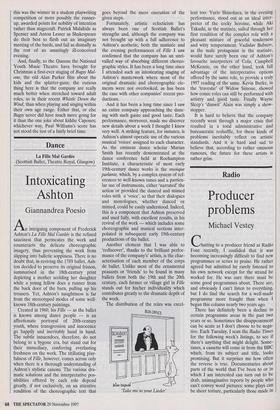Radio
Producer problems
Michael Vestey
Chatting to a producer friend at Radio Four recently, I confided that it was becoming increasingly difficult to find new programmes or series to praise. He rather agreed but admitted he rarely listened to his own network except for the strand he worked for. He was sure there must be some good programmes about. There are, and obviously I can't listen to everything, but I do find the search for a well-made programme more fraught than when I began this column nearly two years ago.
There has definitely been a decline in certain programme areas in the past two years or so. Sometimes the disappointment can be acute as I don't choose to be nega- tive. Each Tuesday, I scan the Radio Times for the following week's listings, to see if there's anything that might delight. Some- times, a cassette will come in from the BBC which, from its subject and title, looks promising. But it surprises me how often the reverse is true. Documentaries about parts of the world that I've been to or in which I am interested can turn out to be drab, unimaginative reports by people who can't convey word pictures; some plays can be sheer torture, particularly those made in the regions — single mothers being beaten by their men in Liverpool or Glasgow in what used to be called kitchen-sink drama. This, I realise, is a matter of taste and some listeners prefer this stark underclass real- ism.
With drama, though, I find myself falling back on the classics, Shakespeare, or a fine Restoration romp like The Relapse by Sir John Vanbrugh which I heard on Radio Three last month in the Sunday Play slot. As it happens, this was produced by a region, Pebble Mill in Birmingham, but it was radio drama at its best. It had an excel- lent cast: Clive Francis as Lord Fopping- ton, Ian Hogg as Sir Tunbely Clumsey, John Duttine as Loveless, Robert Glenister as Young Fashion and others too numer- ous to mention. Vanbrugh's depiction of 17th-century decadence was beautifully directed by Sue Wilson. Of course, seeing it on the stage provides an extra dimension but radio allows you to listen to the dia- logue more keenly. I'm very fond of Restoration comedy from which much of 20th-century satire stems. It's astonishing to think that Vanbrugh, as an architect, designed Castle Howard and Blenheim as well as producing such successful plays.
Returning to my original point, though, I do find it depressing that a fascinating sub- ject can be ruined by producers, the most recent example for me being Romans in Britain on Radio Four which I reviewed recently. What I think has happened over the past few years is a kind of `newsifica- lion' of radio documentaries and features. By this I mean that programmes which were once presented as a straightforward narrative with interviews now appear in a news and current affairs format. Presenters have to be 'on the spot'. It is de rigueur to make allusions to modern television pro- grammes as if we can't conceive of periods of history without comparisons to the pop- ular culture of the present.
Being there, talking breathlessly above background noise, might be a consequence of the BBC's ludicrous internal market which makes its own studios too expensive to hire, but I think it's more to do with a false notion that the news and current affairs approach to serious subjects is more likely to attract wider audiences. My view is that it doesn't bring in new listeners but merely alienates existing ones. Budgets have also been cut to help pay for the BBC's 24-hour television news network which is currently watched by 36 people and some battery chickens in a Notting- hamshire village called Widmerpool. The quiz format also has its place, Round Britain Quiz, I'm Sony I Haven't a Clue (the latter in cracking form in its current sea- son), but here too this format has crept in all over the place as if producers feel a pro- gramme has to be pepped up by point-scor- ing. As if we care which naturalist or historian scores the most when discussing the sex life of the hover fly, or the reign of Henry VIII. Newsification can crop up in the most unexpected programmes. Musical life in Georgian London was magnificent, rich in talented composers and musicians, mostly visitors such as Haydn and J.C. Bach, sec- ond son of the greatest of the 38 known Bachs, Sebastian. The court of George III and Queen Charlotte was filled with their music, and Spirit of the Age on Radio Three (Sunday) made a programme about it. It drew on the memoirs of Charlotte Papandiek, assistant keeper of the Queen's wardrobe, to illuminate the period, but instead of a narration chose a time machine to bring Mrs Papandiek back to life through an actress being interviewed, between musical extracts from the period, by the presenter Michelene Wandor (a dish called Wandor was my subversive thought). Presumably, the producer Lindsay Kemp thought this arrangement might liven it up a bit. Although it was still enjoyable, and I liked Wandor's voice, the format did irritate.



















































































 Previous page
Previous page